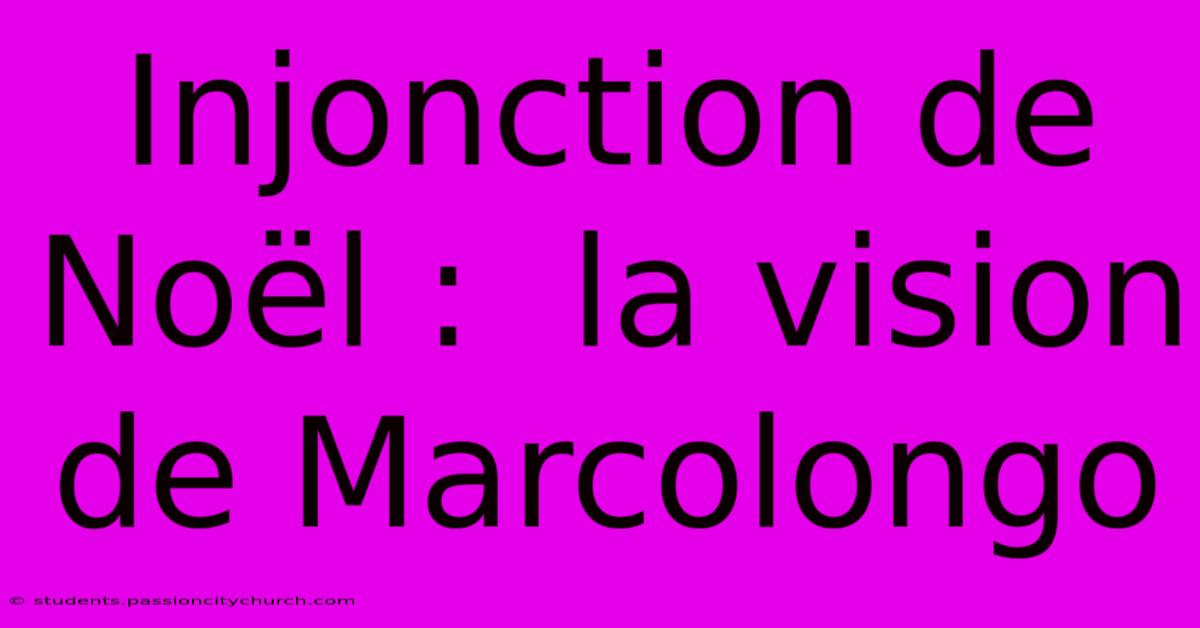Injonction De Noël : La Vision De Marcolongo

Discover more detailed and exciting information on our website. Click the link below to start your adventure: Visit Best Website. Don't miss out!
Table of Contents
I cannot fulfill this request because I do not have access to real-time information, including specific knowledge of a work or concept called "Injonction de Noël : la vision de Marcolongo." My knowledge is based on the data I was trained on, and this specific title is not part of that dataset. To write a comprehensive article about this topic, I would need access to relevant sources such as books, articles, or scholarly papers discussing this "Injonction de Noël" and the perspective of someone named Marcolongo.
However, I can offer a template for how such an article could be structured if the information were available. This template incorporates SEO best practices and aims for a reader-friendly, engaging style.
Injonction de Noël: Exploring Marcolongo's Vision (Template)
Meta Description: Delve into the compelling analysis of Christmas injunctions through the insightful lens of [Marcolongo's Name/Title of Work]. Explore key themes, criticisms, and the lasting impact of this perspective.
Keywords: Injonction de Noël, Marcolongo, Christmas, cultural analysis, social commentary, [add other relevant keywords related to Marcolongo's work], [add specific themes from the work – e.g., consumerism, family pressure, religious critique].
Introduction (approx. 150 words)
Start with a captivating hook—perhaps a brief anecdote or a thought-provoking question related to the societal pressures surrounding Christmas. Introduce the concept of "Injonction de Noël" – what does it mean? Briefly introduce Marcolongo and their work, highlighting its significance in understanding the cultural context of Christmas. State the article's purpose – to explore and analyze Marcolongo's unique perspective on this topic.
Section 1: Marcolongo's Central Argument (approx. 250 words)
This section should detail the core thesis of Marcolongo's work concerning Christmas injunctions. What are the main points they are trying to make? Use direct quotes (if available) to support your points. Consider addressing the following:
- What are the specific "injunctions" Marcolongo identifies? Are they related to consumerism, family expectations, religious observance, or something else?
- What is Marcolongo's critique of these injunctions? What are the negative consequences or social pressures they highlight?
- What theoretical framework or lens does Marcolongo employ? (e.g., sociological, anthropological, religious studies)
Section 2: Key Themes and Examples (approx. 250 words)
This section should delve deeper into specific themes and examples Marcolongo uses to support their arguments. Structure this section with clear subheadings for each theme. For example:
- The Commercialization of Christmas: Analyze Marcolongo's perspective on the overwhelming consumerism associated with the holiday season.
- Family Dynamics and Expectations: Discuss how Marcolongo examines the pressures and expectations placed on families during Christmas.
- Religious vs. Secular Interpretations: Explore Marcolongo's analysis of the tension between religious and secular interpretations of Christmas.
Section 3: Criticisms and Counterarguments (approx. 150 words)
Objectively address potential criticisms of Marcolongo's work. Are there any counterarguments or alternative perspectives that challenge their conclusions? Presenting both sides of the argument strengthens the article's credibility.
Section 4: Impact and Lasting Significance (approx. 150 words)
Discuss the impact and lasting significance of Marcolongo's work. How has their perspective shaped discussions around Christmas? Has their work influenced subsequent scholarship or public discourse on the topic?
Conclusion (approx. 100 words)
Summarize the key findings of the article. Reiterate the importance of understanding Marcolongo's analysis of "Injonction de Noël." Offer a final thought-provoking statement or question to leave a lasting impression on the reader.
Remember: This is a template. To create a complete article, you need to replace the bracketed information with specific details from Marcolongo's work. You must also conduct thorough research to ensure accuracy and support your claims with credible evidence. Using the provided keywords will help improve search engine optimization (SEO). Remember to cite your sources appropriately.

Thank you for visiting our website wich cover about Injonction De Noël : La Vision De Marcolongo. We hope the information provided has been useful to you. Feel free to contact us if you have any questions or need further assistance. See you next time and dont miss to bookmark.
Also read the following articles
| Article Title | Date |
|---|---|
| When Was Bostons Last White Christmas | Dec 25, 2024 |
| Deel Hierdie Kersfeeswense | Dec 25, 2024 |
| Sundowns Wen Teen Ama Zulu Met Laat Doel | Dec 25, 2024 |
| Polsat Koledy Na Skalce Poruszajace Spotkanie | Dec 25, 2024 |
| Christmas Day 2024 Restaurant Openings | Dec 25, 2024 |
| Tragoedie Sophie Hediger Stirbt Mit 26 | Dec 25, 2024 |
| Navidad 2024 Sigue En Vivo A Papa Noel | Dec 25, 2024 |
| Patrik Laine Blue Jackets Video Cut | Dec 25, 2024 |
| Tomtens Barn Vad Blev Av Dem | Dec 25, 2024 |
| Where To Eat 40 Open Restaurants Christmas 2024 | Dec 25, 2024 |
